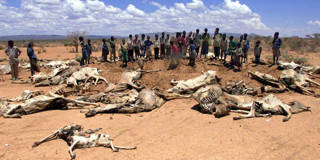 Joel Robine/Getty Images
Joel Robine/Getty Images
防止非洲再次爆发饥荒
纽约——在经过十多年的下降后,世界陷入饥饿的人数正再次上升。今年爆发了二战后全球最严重的粮食危机,南苏丹、也门、索马里和尼日利亚徘徊在崩溃边缘或者爆发饥荒。仅上述四国就有超过两千万人仍面临严重的粮食短缺,而据联合国估计需要提供价值18亿美元的紧急人道主义援助。
https://prosyn.org/G84InyKzh
To continue reading, register now. It’s free!
Register Now
Already have an account?
Log in



纽约——在经过十多年的下降后,世界陷入饥饿的人数正再次上升。今年爆发了二战后全球最严重的粮食危机,南苏丹、也门、索马里和尼日利亚徘徊在崩溃边缘或者爆发饥荒。仅上述四国就有超过两千万人仍面临严重的粮食短缺,而据联合国估计需要提供价值18亿美元的紧急人道主义援助。